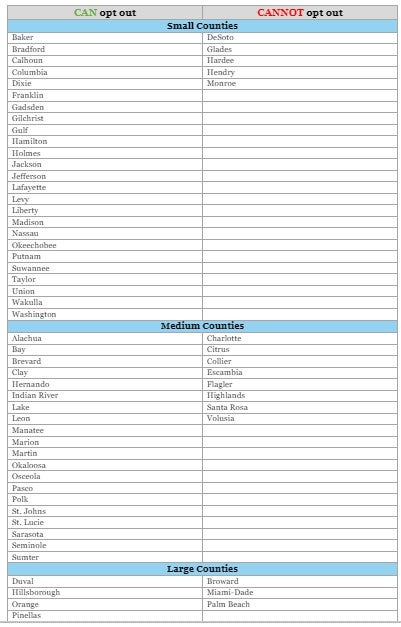Florida’s Live Local Act was amended during the 2024 legislative session to allow local governments to opt out of the middle-income affordable housing exemption1 with a two-thirds vote of the governing body if the county has an adequate supply of affordable housing units. This opt-out provision would apply to the middle-income units in an affordable housing project which are leased to tenants with income of more than 80% but not exceeding 120% of median income (which middle-income units would otherwise be eligible for a 75% exemption). The opt-out does not apply to the exemption for units occupied by tenants with 80% or less of median income (which are eligible for a 100% exemption). This means that if a county has an adequate number of affordable housing units, as determined by the Shimberg Center for Housing Studies, then the county, municipality, and/or school district can, by a two-thirds vote, reject the exemption for their share of the taxes on the middle-income units. For example, if a county is listed as having adequate affordable housing, and a city council in the county votes to opt out of the exemption, then the affordable project would still be required to pay the city’s share of the tax on the middle-income units. If all the local taxing jurisdictions vote to opt out, then the affordable project would have to pay the full amount of tax on its middle-income units.
Under this amendment (adding Sec. 196.1978(3)(o) to the Florida Statutes), a county is deemed to have an adequate supply of affordable housing if the Shimberg Center for Housing Studies concludes there are more affordable rental units in the county than the number of renting families at or below 120% of median income. Because this opt-out election by the local jurisdictions must be voted on every year, the exact tax burden will not be certain from year to year.
The Florida Housing Finance Corporation has released the list of counties that have an adequate supply of affordable housing in 2024 (which would allow the taxing jurisdictions to opt out of the exemption) and the counties that do not have an adequate supply (which would not allow the opt-out). The list is organized by small, medium, and large counties. For the large county sector, Miami-Dade, Broward, and Palm Beach counties are the large counties that have been determined not to have an adequate supply of affordable housing for 2024, so the exemption would be available for projects in these counties. On the other hand, the large counties that have adequate affordable housing are Duval, Hillsborough, Orange, and Pinellas, so taxing jurisdictions in these Florida counties may opt out of the exemption there. However, since the determination of adequate affordable housing is made on a year-by-year basis, we won’t know whether this will be the case in 2025, or the year after. See the table below for a full listing of this housing supply calculation.
This opt-out provision contains a grandfather clause for the owners of affordable housing projects who have been granted the exemption before a local taxing jurisdiction votes to opt-out; however, this grandfather provision may be of limited use because this grandfather rule is personal to the owner and does not run with the project. Consequently, if the project is sold or merely transferred to a related entity in a restructuring, the new owner would not be grandfathered, and the exemption would be lost. Furthermore, it is possible that many taxing jurisdictions in counties which have an adequate supply of affordable housing will opt out of this exemption as soon as they can, in which case this grandfather rule might not be available to many projects, except for the ones that that have already received the exemption for 2024. Accordingly, depending on whether all the local taxing jurisdictions (county, city, and school district) vote to opt out, and the timing of such votes, it is possible that some affordable housing projects might never be eligible for the benefits of this exemption for its middle-income units.
This ability for taxing jurisdictions to opt out of the exemption, when added to the clarification regarding the county property appraiser’s role to enforce the requirements of the exemption, will diminish the potential value of the Live Local Act property tax exemption, which was intended to be an incentive for the development of multifamily residential projects with an affordable housing component. In addition, a risk remains that the courts might invalidate this exemption altogether if the exemption is challenged on the basis that it does not serve a charitable purpose.
Investors who are creating economic models to determine the profitability of an investment in an affordable multifamily project should not rely on this exemption to be available for the entire holding period. A worst-case economic model scenario would assume no available exemption.




 />i
/>i

